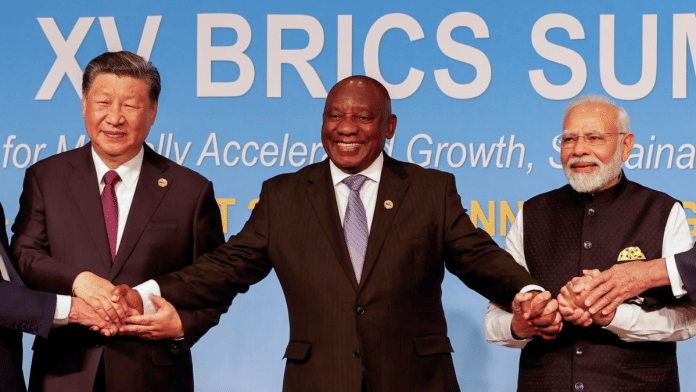The Ninth Ministerial Conference of the Forum on China-Africa Cooperation took place in Beijing from 4 to 6 September 2024, under the theme ‘Joining Hands to Advance Modernisation and Build a High-Level China-Africa Community with a Shared Future’. With the exception of Eswatini, leaders from 53 African nations, along with the Chairperson of the African Union Commission, HE Moussa Faki Mahamat, attended the summit. UN Secretary-General António Guterres was also a special guest. During the summit, China established or elevated strategic partnerships with 30 countries.
Additionally, China-Africa relations were upgraded from a comprehensive strategic and cooperative partnership to an all-weather community, symbolising the high importance China places on Africa.
In his keynote address, Chinese President Xi Jinping offered nearly $51 billion in soft loans, grants, and investment. At the 2021 China-Africa summit in Dakar, Senegal, China had promised at least $10 billion in investment and an equal amount in credit lines. This time, China committed 360 billion yuan or $50.7 billion in financial assistance over three years. However, it specified that 210 billion yuan would be disbursed through credit lines, while only 70 billion yuan would be allocated as fresh investment by Chinese companies.
While the $51 billion offer sounds impressive, it is highly misleading. Around $29 billion will be allocated for “credit lines”, which are likely to benefit Chinese firms more than African stakeholders. Additionally, the $10 billion designated as “investment” shouldn’t be considered a direct government financial pledge, as it will likely come from private Chinese enterprises, especially in the mining sector. And then there’s the $11 billion in assistance, most likely various forms of foreign aid. Finally, this amount is spread over three years, which isn’t huge for a country as large as China and significantly less than the $8 billion in humanitarian aid that the US commits to Africa annually.
Furthermore, according to a six-point proposition on China-Africa joint efforts to advance modernisation, ten partnership actions were proposed, covering the areas of mutual learning among civilisations, trade prosperity, industrial chain cooperation, connectivity, development cooperation, health, agriculture and livelihoods, people-to-people exchanges, green development, and common security.
President Xi Jinping also called for a China-Africa network of land and sea links and coordinated development. This would undoubtedly be dovetailed with the Belt and Road Initiative (BRI) as the stated goal of BRI is to develop land and sea connections between Asia and Europe via Africa. Under this, China has pledged 30 infrastructure connectivity projects and 30 clean energy projects in Africa. Xi announced 60,000 training opportunities for women and youth and 7,000 for military and police personnel, while also extending invitations to 1,000 members of African political parties to visit China. He has also promised to cooperate on nuclear technology to tackle a power deficit that has delayed African industrialisation.
Also read: India’s economic sway in Africa is far behind China’s but ‘trump cards’ yet to be played
AU in G20
During the Summit, China pledged to all 33 least developed African countries zero-tariff treatment for 100 per cent tariff lines. When implemented, it could boost African exports to China. However, in a typically Chinese mode of functioning, no details have been provided regarding the implementation plan for these grandiose announcements.
Despite being the largest bilateral lender to many African states and holding about 60 per cent of Africa’s bilateral debt, this issue didn’t feature in Xi’s inaugural speech, although the action plan included terms for repayment postponements and called for establishing an African rating agency. Interestingly, in a first, China announced its support grants and loans in yuan. Currently, international payments in RMB account for 6 per cent of all currency transactions, ahead of the Euro’s share of 5.3 per cent. This marks a significant step toward de-dollarisation and promotion of the Chinese yuan.
At the end of the summit, delegates adopted a 30-paragraph-long Beijing Declaration. Chinese signature projects, including the Global Development Initiative (GDI), the Global Security Initiative (GSI) and the Global Civilization Initiative (GCI) all found mention in the document. The declaration further stated that Africa values China’s role as the first nation to back the AU’s inclusion in the G20. The statement appears to implicitly endorse China’s effort to negate India’s claim of helping Africa become a permanent member of G20 under its presidency.
Indeed, India demonstrated its commitment to its global message of ‘One Earth, One Family, One Future’ by pushing for the African Union’s permanent inclusion in the G20. However, the last India-Africa Forum Summit (IAFS) took place in New Delhi way back in 2015; significant shifts in global geopolitics and geoeconomics have occurred since then. To build on past successes and address the changing global context, it is crucial for India to keep its engagement with Africa forward-looking and hold the much-awaited fourth IAFS soon. With a hyperactive China lurking, New Delhi does not have the luxury of resting on past laurels when it comes to its Africa policy.
Harsh V. Pant is Vice President of Studies and Foreign Policy and Samir Bhattacharya is Associate Fellow, Africa, at the Observer Research Foundation (ORF) in New Delhi.
(Edited by Aamaan Alam Khan)






